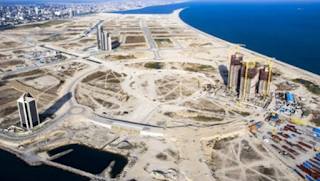The expense of acquiring land in Lagos’ prime coastal development, Eko Atlantic, has surged from roughly N180 million in the early 2000s to over N2 billion per plot, according to the third edition of the State of Lagos Housing Market report.
The document, published by the Roland Igbinoba Real Foundation for Housing and Urban Development, emphasizes the significant increase in land valuations throughout Lagos, particularly within the luxury real estate sector.
“The last decade has signified a phase of substantial evolution for the Lagos real estate market, especially within its luxury sector. What was previously a marketplace with relatively accessible land plots has swiftly transformed into a fiercely competitive and premium investment locale, propelled by a dynamic interaction of economic, demographic, and infrastructural influences,” the report indicated.
It observed that land values citywide have consistently inclined upward with no notable decline, cautioning that postponements in investment only translate to escalated entry expenses.
“A striking example of this trend is evident in Ibeju-Lekki. A parcel of land in this locality, which was available for as little as N500,000-N1.5 million in 2013 (before substantial development hubs such as the Lekki Free Trade Zone), experienced a value increase to N5 million-N10 million by 2018 as major infrastructure projects commenced.
“By the first quarter of 2025, the same land commanded prices between N25 million and N40 million, representing a potential 40-fold augmentation in value over a decade. Likewise, plots in Lekki Phase 1 that were valued at N10 million – N15 million in 2005 are now appraised at over N400 million – N500 million. Land costs in Eko Atlantic, which stood at N180 million per plot in the early 2000s, have similarly escalated to over N2 billion today.
“This remarkable appreciation highlights that real estate in Lagos has evolved into a primary vehicle for wealth accumulation. The market’s dynamism is influenced less by an essential housing need for the general population and more by its role as a high-yield investment vehicle for the affluent, including a notable segment of diaspora investors. This positions luxury real estate as a pivotal mechanism for wealth generation and preservation in Lagos, particularly for those possessing patient capital and a long-term investment perspective. ”
The document attributes the value enhancement to several interconnected trends, including rapid urbanization, population growth, and the increasing demand for premium real estate.
“Urbanization and population growth: Lagos’s population has swiftly escalated, reaching nearly 24 million inhabitants, with an annual growth rate of 2.5 percent. The city encounters an influx of over 6,000 immigrants daily, with approximately 50 percent opting to remain, significantly intensifying the housing demand across all categories, including luxury. The population is anticipated to exceed 25 million by 2025, further propelling this demand. ”
Notwithstanding infrastructure issues, Lagos’ upscale developments frequently provide top-tier amenities, rendering them attractive to affluent individuals. Attributes typically present in such properties encompass home automation, personal gyms, swimming pools, and in select instances, helipads and golf courses.
Infinity pools, concierge services, wellness centers, and lavish interior finishes are becoming commonplace, with residences featuring imported sanitaryware, high-quality tiles, and premium fixtures. Numerous properties also integrate home offices, entertainment lounges, and cinema rooms.
The report indicated, “Architectural styles within the luxury sector are varied, spanning from sleek, modern minimalist designs characterised by clean lines, open layouts, and expansive windows that effortlessly merge indoor and outdoor living, to more traditional styles that showcase intricate woodwork and local materials, reflecting Nigeria’s rich cultural heritage.
“Beyond the tangible attributes, exclusivity and prestige are integral to the definition of luxury housing in Lagos. Affluent neighborhoods such as Banana Island, Ikoyi, Lekki Phase 1, and Victoria Island are widely perceived as emblems of wealth, status, and contemporary urban living. Residing in these locales signifies social achievement and positions individuals among West Africa’s elite.
“Location-specific benefits further amplify this allure; for example, inhabitants of Banana Island and Victoria Island relish waterfront views, upscale shopping centers, fine dining options, and close access to business districts, aligning with expectations of international luxury buyers. ”







